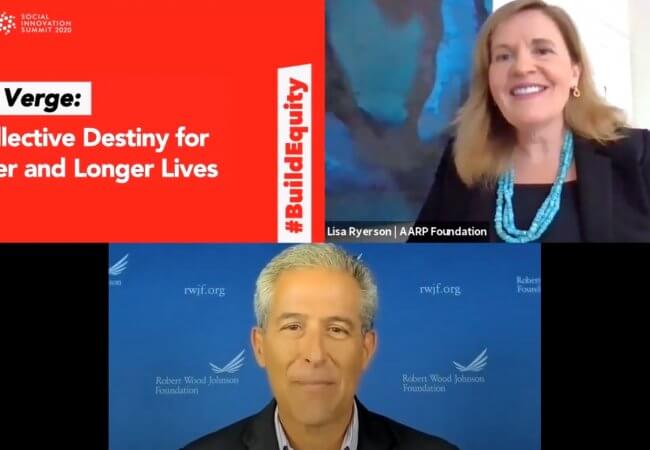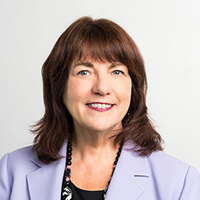
Sep 08, 2020
Collective Destiny: “We Must Agree on What Is Needed”
“The failures of public policy and imagination have been stalking us for years, creating haves and have-nots,” wrote Richard Besser, MD, in an opinion piece earlier this year when COVID-19 had just begun appearing in the U.S. That searing observation was the essence of a conversation between Besser, president and CEO of the Robert Wood Johnson Foundation, and Lisa Marsh Ryerson, president of AARP Foundation, on August 27.
Now the pandemic has turned those failures into societal fissures far more evident to all. The webinar “On the Verge: Our Collective Destiny for Healthier and Longer Lives,” part of AARP’s Social Innovation Summit, also allowed Besser and Ryerson to talk of some rays of hope—promising practices and initiatives that that can lead to equitable outcomes for all.
It is not coincidence that COVID-19 has hit specific populations far harder than others. Said Ryerson: “Blacks and Hispanics have been hospitalized and are dying at disproportionally higher rates.”
Besser, who spent years at the Centers for Disease Control and Prevention, leads the largest private foundation in the country devoted solely to improving the nation’s health. Ryerson’s AARP Foundation has as its goal a country free of poverty, where no older person feels vulnerable. Both know that health inequality is not simply a matter of a person’s choices, but of the structure and systems built over time that form invisible ladders for some, obstacles to others.
Much of the hour-long talk sought to answer the question: What will it take for the nation to restructure that which it built, so that people have equal opportunity to protect their health and that of their families?
Besser gave a simple example, a tale of two towns, to illustrate the systemic inequity that COVID has brought out in sharp relief. Besser spoke from Princeton, New Jersey, where he grew up and works—and where the average life expectancy is 87. Fourteen miles away is Trenton, where Besser continues to practice on a volunteer basis as a pediatrician—people born there on average live to 73.
Fourteen miles, 14 years.
“What that difference in life expectancy points to is issues of structural racism, differences in opportunity in terms of being able to lead a healthy life,” Besser told Ryerson.
“If you look at the history of Trenton, you see a history of underinvestment. If you look at the history of New Jersey, just like the history of every state in the country. You see structural barriers put up to social mobility, so that we as a nation end up incredibly segregated. And with that segregation comes segregation from opportunities for jobs, for high-quality schools, for safe places to play, for access to healthy food.”
What are some answers? Action at the community level, and policy as well. More fundamentally, though, said Ryerson, building equity “is about national accountability”— the need to understand that we built a system that needs to be fixed, and the will to fix it.
Myth of “Lifting Yourself by the Bootstraps”
Action at the local level starts with local leadership, as evident in an example Besser gave of how community members made their town healthier. In rural Allen County, Kansas, where in 2010 longtime residents realized they soon would have no hospital, neighbors together agreed to increase their sales taxes to support building a new hospital. Residents also brought back a local grocery store. (These actions also earned the region a Culture of Health prize from the Robert Wood Johnson Foundation in 2017.)
“What I like about [Allen County],” Besser says, “is community identifying what needs to happen and doing it.
“But there’s a bit of a myth that you can lift yourself up by your bootstraps. …That as a total solution isn’t going to work. You have to look at how we’re investing, and not investing, where government dollars are going, and address that from a policy perspective.”
Yes to policy, affirmed Ryerson, who added, “It’s about agreeing that we actually want equitable outcomes. That we don’t want race as a barrier to equitable outcomes.”
And the pandemic has made policy more important than ever. As Besser said, “Health is about more than health care — but health care is an important piece.”
Indeed, AARP Foundation and RWJF have long worked together to put into place programs and policies to end the inequities and help all lead healthier, longer lives. Many of their programs involve acting as catalysts in supporting ways that will lift other voices, encouraging often overlooked communities to lead.
Nurses and Equity
One initiative that combines policy and action, a campaign co-sponsored by AARP Foundation, AARP, and RWJF that puts equity at the center of health, is the Center to Champion Nursing in America. Its Campaign for Action has already succeeded in expanding and strengthening the nursing field so that more, and more highly educated nurses of a diversity of ethnicities and backgrounds, are available to provide high-quality care to more Americans.
Besser pointed to the Campaign as “incredibly exciting, a critical piece of solving this problem”— because the campaign is also an example not only of actions carried out with neighbors, within communities, but also of leadership-building that results in greater equity. Just as nurses are increasingly leading health efforts, Besser sees leadership development among other industries and communities as the key catalyst in creating equity in America.
”We support leadership development across sectors,” says Besser. We “look to help build the capacity within communities for people to address the problems that they see.
“It’s not that they lack solutions. People closest to problems will be more likely to have solutions than we will. It’s helping them with agency, helping increase community power—so they can effect change.”
The concept of equity has until recently not been a huge part of conversations and policy about improving society. With the antiracism movement, Besser says, other voices are finally being heard. But, he also noted, in this country, “there’s a lot more to be done if we truly believe that everyone should have a fair opportunity to protect their health and the health of their communities.”
 Susan C. Reinhard is the senior vice president and director for public policy at AARP and the chief strategist for the Center to Champion Nursing in America.
Susan C. Reinhard is the senior vice president and director for public policy at AARP and the chief strategist for the Center to Champion Nursing in America.
